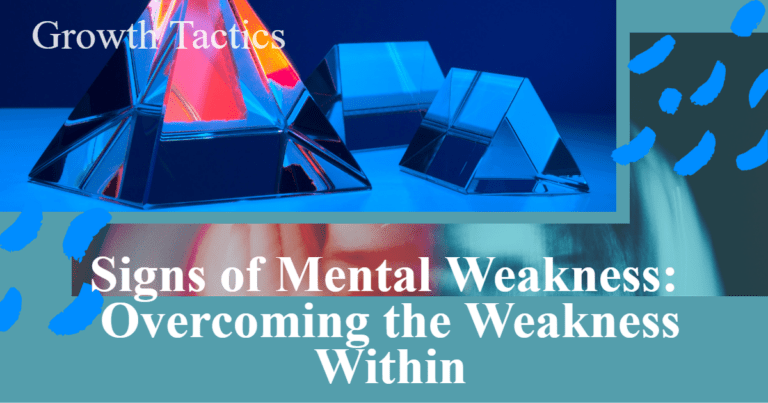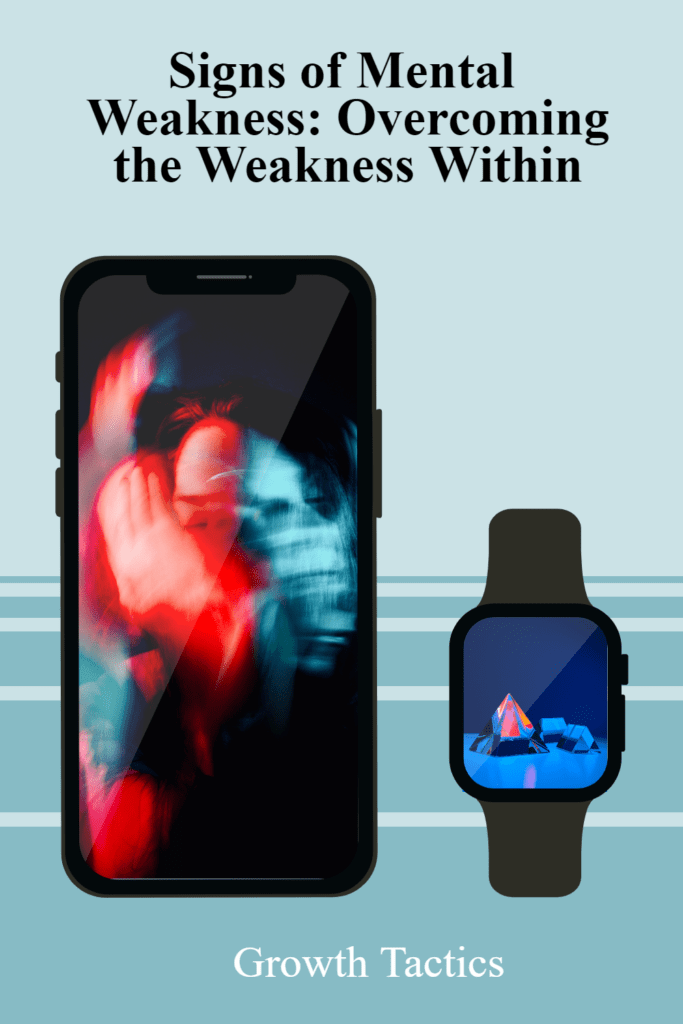Do you ever find yourself feeling mentally drained? Perhaps you struggle with self-esteem or have difficulty regulating your emotions. If so, you may be experiencing signs of mental weakness. In this article, we will explore the concept of mental weakness, its signs, and how to overcome it. By understanding these aspects, you can develop mental strength and achieve your full potential.
Jump To Section
Understanding Mental Weakness: What it means to be weak-minded
At times, we may encounter individuals who exhibit signs of being weak-minded. This weakness can manifest in various ways, often leading to emotional instability and insecurity. Understanding the signs of weak-mindedness is crucial in identifying areas where personal growth is needed. A weak-minded person may possess a victim mentality, constantly blaming others for their circumstances. They may also display insecurity, seeking external validation and obsessing over others’ opinions.
Recognizing the Signs: Indications of Weakness
Being mentally or emotionally weak doesn’t mean you’re a weak person. On the contrary, acknowledging and addressing our weaknesses may indicate a higher likelihood of strength and personal growth. So, let’s dive into recognizing the signs of mental weakness—those red flags that indicate areas where we can grow and improve as individuals.
Struggling with Self-Esteem
Another sign of mental weakness is struggling with self-esteem. When we have low self-esteem, it becomes challenging to recognize our own worth. This can lead to feeling inferior to others, making it difficult to accept compliments, handle criticism, or accurately evaluate our abilities. Low self-esteem can also foster feelings of jealousy, self-doubt, and an inability to take risks. These emotions can hinder our growth and development, reinforcing the cycle of feeling inadequate.
Inability to Regulate Emotions
The inability to regulate our emotions is yet another sign of mental weakness. When our emotions become overwhelming and unmanageable, it can lead to impulsive and destructive reactions. People who struggle with emotional regulation may experience frequent emotional outbursts and have difficulty managing stress effectively. Over time, these negative patterns can take a toll on our mental and physical well-being.
Obsessing Over Shortcomings
For individuals with mental weakness, obsessing over their shortcomings is a common behavior. Whether real or perceived, those who constantly focus on their flaws and vulnerabilities find it difficult to recognize their strengths and potential. Instead of moving forward, they become stuck in a cycle of self-criticism and self-doubt.
Seeking External Validation
Lastly, seeking external validation is another indication of mental weakness. When we constantly seek reassurance and recognition from others, it reflects a lack of ability to validate ourselves. This preoccupation with others’ thoughts and opinions can lead to people-pleasing behaviors and an inability to assert our own needs and values. Seeking validation from external sources can inhibit our own personal growth and hinder our sense of self-worth.
Mental Strength: The Key to Overcoming Mental Weakness
When it comes to overcoming mental weakness, the secret lies in developing mental strength. Just like physical strength, mental strength is something that can be cultivated and fortified over time. By honing this vital trait, we can navigate life’s challenges with resilience and grace. So, let’s dive into why mental strength is the key to overcoming mental weakness and how we can develop it.
The Power of Mental Strength
Mental strength is like a superpower that empowers us to face adversity head-on, bounce back from setbacks, and thrive in the face of challenges. It’s the ability to stay focused, persevere, and maintain a positive outlook even when things get tough. Having mental strength means having the inner resources and resilience to withstand the stormy seas of life.
Developing Mental Strength: A Journey of Growth
Developing mental strength is not a one-time event but rather a continuous journey of growth. It’s a practice that requires consistent effort and dedication. Here are a few strategies that can help us harness our mental strength:
Developing a Growth Mindset: Embrace the belief that challenges are opportunities for growth rather than insurmountable obstacles. Adopting this growth mindset enables us to approach adversity with curiosity and a desire to learn, ultimately fueling our mental strength.
Embracing Self-Reflection: Engage in regular self-reflection to gain insight into our thoughts, emotions, and behaviors. By developing self-awareness, we can identify areas where we may be mentally weak and take proactive steps to strengthen them.
Building Resilience: Resilience is the ability to bounce back from setbacks and adapt to change. Cultivate resilience by reframing setbacks as learning experiences, nurturing a positive outlook, and seeking support from loved ones during challenging times.
Setting Realistic Goals: Setting realistic and achievable goals helps us maintain focus and motivation. Break larger goals into smaller, manageable tasks, and celebrate each milestone along the way. This approach builds confidence and reinforces our mental strength.
Practicing Self-Care: Taking care of our mental and emotional well-being is crucial for building mental strength. Prioritize self-care activities such as exercise, proper sleep, relaxation techniques, and engaging in hobbies that bring joy and rejuvenation.
Seeking Support: Don’t hesitate to reach out for support when needed. Lean on trusted friends, family members, or seek professional help from therapists or counselors. Having a strong support network can provide valuable guidance and encouragement as we navigate our journey towards mental strength.
Celebrating Progress, Not Perfection
It’s important to note that developing mental strength is not about achieving perfection. It’s about progress. Embrace each step forward and recognize that setbacks and challenges are part of the process. Every experience, whether positive or negative, offers an opportunity for growth and strengthens our mental fortitude.
The Reward: A Resilient and Empowered Mind
As we develop mental strength, we’ll notice a remarkable transformation within ourselves. We become more resilient, adaptable, and capable of handling life’s uncertainties. Rather than being overwhelmed by mental weakness, we’ll approach challenges with confidence and determination. Our newfound mental strength will empower us to face obstacles head-on, maintain healthy relationships, and achieve our goals.
Remember, building mental strength is a journey unique to each individual. It requires patience, self-compassion, and a commitment to personal growth. So, let’s embrace this journey, celebrate our progress, and unlock the potential within us to overcome mental weakness with unwavering mental strength.
Emotional Regulation: Building a Strong Mindset
One crucial aspect of building mental strength is mastering emotional regulation. Mentally strong individuals excel at managing their emotions, allowing them to respond constructively to difficult situations. They practice deep thought and understanding of the emotions of others, resisting the urge to over-analyze. By focusing on cultivating a strong mindset and managing their emotions effectively, they can positively change their lives.
Taking Responsibility: Holding Yourself Accountable
Avoiding a victim mentality is essential in developing mental strength. Strong-minded individuals understand that life is not always fair, but they refuse to let negative experiences define them. Instead of blaming others, they take responsibility for their actions and work towards personal growth. They recognize that no one is perfect, and the judgment of others can hinder their own progress.
Embracing Change and Growth
A strong-minded person understands that change is a necessary part of personal growth. They embrace opportunities and challenges alike, always striving to become the best version of themselves. They do not shy away from discomfort and understand that sometimes it’s necessary to face the truth and make difficult decisions. By embracing change and growth, they unleash their full potential.
Finding Support: Seeking Help and Validation
Sometimes, we all need a little help and validation in our lives. Whether we’re going through a challenging time or facing a difficult decision, having support can make all the difference. In this section, we’ll explore various ways to find the support we need, including seeking help from others and finding validation for our feelings and experiences.
Seeking Help
Seeking help can be a powerful tool in navigating life’s ups and downs. It’s important to remember that we don’t have to face everything alone. If you find yourself needing assistance, there are several avenues you can explore:
Reach out to friends and family: Our loved ones are often our first line of support. They know us well and can provide a listening ear, advice, and encouragement when we need it the most. Don’t hesitate to share your struggles with them and ask for their help.
Join a support group: Sometimes, it can be comforting to connect with others who are going through similar experiences. Support groups provide a safe space to share your thoughts and emotions, learn from others, and receive guidance. You can find local support groups through community centers, hospitals, or online platforms.
Consider therapy: Therapy is not just for people with diagnosed mental health conditions. It can be immensely beneficial for anyone who is seeking support and guidance. Therapists provide a non-judgmental space for you to express your feelings, explore your thoughts, and develop coping strategies. There are many types of therapy available, such as cognitive-behavioral therapy (CBT) or psychotherapy. Reach out to a mental health professional to explore your options.
Finding Validation
Finding validation for your feelings and experiences is equally important. Sometimes, we need reassurance that what we’re going through is normal and understandable. Here are a few ways to seek validation:
Educate yourself: Learning about similar experiences can help validate your feelings. Look for books, articles, or online resources that discuss topics related to your struggles. By understanding that others have gone through similar challenges, you can find comfort in knowing that you’re not alone.
Connect with online communities: The internet provides a vast array of communities where you can find support and validation. Whether it’s a forum, social media group, or online support platform, connecting with others who share your experiences can be incredibly validating. Engage in conversations, ask questions, and share your thoughts to find a sense of validation.
Seek professional validation: If you feel that your struggles are affecting your daily life and well-being, seeking validation from a mental health professional can be valuable. They can offer an objective perspective and help you understand the validity of your feelings. They can also provide guidance on how to cope with and navigate through your emotions.
Remember, seeking support and validation is not a sign of weakness; it’s a sign of strength and self-awareness. We all need help and validation at times, and reaching out is a courageous step toward growth and healing.
For additional resources and information on seeking support and validation, you may find the following links helpful:
Conclusion
In conclusion, mental weakness is not a lifelong sentence. By understanding the signs of mental weakness and taking proactive steps to overcome them, anyone can develop mental strength and achieve their goals. Remember, no one is perfect, and we all have strengths and weaknesses. Embracing change, taking responsibility, and seeking support are essential components of building mental resilience. By doing so, you can unlock your full potential, overcome mental weakness, and lead a fulfilling life.
So, don’t let mental weakness hold you back. Embrace the journey of personal growth and become the strong-minded individual you are meant to be. Remember, life’s challenges are just opportunities in disguise.


